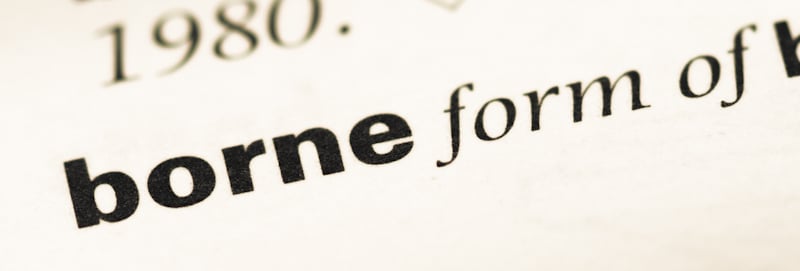The verb “bear” has more than a couple of past participles to its credit. However, those variations of the word do not mean the same thing – the context and accompanying words ascertain their final meanings. That is certainly the case with the terms “born” and “borne”.
The word “born” means “to give birth”, and it should be used in sentences that carry the same meaning. The term “borne”, however, means “transmit” or “carry”, and should be used in your writings accordingly. That said, the word could also be used to mean “birthing”, in a figurative sense.
Keep reading to learn the meanings of the two terms, their roots and origins, how to use them in a range of writing scenarios, how the two terms overlap with each other, and lots more.

A Brief Intro to the Verbs “Born” and “Borne”
The word “born” is the past participle of “bear”, which means to “bring about”, “carry”, or “tolerate something”. The verb “bear” could also mean bringing an offspring or baby into the world.
Like “born”, the word “borne” is also the past form of “bear”, and it means “transmitted or transported by”. The term “borne” could be used instead of “carried”, “kept”, “suffered”, and at times “given birth”.
Origins of “Born” and “Borne”
The verb “born” comes from the Old English term “boren”, which is the past form of “beran”, meaning “to bear”. “Beran” is the Old English word of Germanic origin and some Indo-European, Greek, and Latin influences. The term “borne” has its roots in “beran” too.
“Bear” – Laying the Foundation
The word “bear” essentially means “to tolerate something”. The term is commonly used in expressions such as “can’t bear”. The past participle is “bore” and “borne” is its “-ed” form.
The verb “bear”, as mentioned above, is at times used for describing the act of “birthing”. It’s commonly used in past participle and in formal contexts. When discussing “giving birth”, the word “have” is more common.
“Born” and “Borne” – Unique Homophones
The terms “born” and “borne” are homophones, which means they sound the same when pronounced but have different meanings and spellings. However, unlike other homophones, these two words work as the same speech element, as mentioned above. Their usage is ascertained primarily by the context in which they get used.
Both “born” and “borne” need “helping” or “auxiliary verbs” to carry them in a sentence. The helping verbs commonly used in tandem with them include “be”, “been”, “being”, “were”, “was”, and “am”, to name a few. These supporting verbs help “born” and “borne” to exhibit potential or possibility or create an entirely different verb tense.
Using the Word “Born” in Writings
There is a slight yet significant difference between “born” and “borne”. When emphasis must be put on an offspring or a thing brought forth through birth, the verb to use is “born”, and it must occur in passive sentence constructs only. For example:
- She was born in Oklahoma.
- No kids have been born near the North Pole ever since.
- The kids were born after they got married.
The term “born” is also commonly used to denote someone possessing a quality or character from birth or to indicate someone is the native of a particular region, as in “German-born doctor” or a “Miami-born New Yorker”.
Suppose a woman gave birth to a baby in Germany. In that case, the baby becomes a German-born person. The phrase “German-born” doesn’t indicate the country of Germany gave birth to the baby. It just means the baby was born on German soil.
The word “born” also works as an adjective, meaning “innate”, “by birth”, or “native”. A scientist can be a “born” genius or expert, but they cannot be a “borne” scientist. The phrase “borne scientist”, in fact, means the scientist likes being carried around.
Though the word “born” is used to refer to childbirth, the term could also be used figuratively. Here is a sentence demonstrating the same:
- The protests were born out of the council member’s refusal to permit the hiring of additional teachers.
When used figuratively, the term “born” could mean “arising from”, as illustrated in the above sentence.
Using the Word “Borne” in Writings
The word “borne” too, as mentioned above, is the past form of “bear”, but it doesn’t denote physical birth or is not incorporated in sentences in that sense. The word, as mentioned above, is primarily used to mean “carried” or something similar. For example:
- Judges have borne the burden of responsibility always.
- He had borne ammunition against us.
The same sentence can be modified a bit to replace “borne” with “bear”, exhibiting “borne” is indeed the past participle of “bear”:
- Judges have to bear the burden of responsibility always.
That said, “borne” could come extremely close to “born” in meaning at times since the word also fits in where the intended message’s meaning is on the lines of “to bring about” or “to produce”. For example:
- Our plans have borne fruit.
In the sentence above, the term “borne” comes dangerously close to the word “birth”, in the literal sense.
The past participle “borne” is commonly used in phrases such as “mosquito-borne disease” or “foodborne illness”. In these example phrases, “borne” translates as “carried by”. Neither “mosquitoes” nor “food” birthed the disease.
“Borne” – Alternate Meanings
The verb “borne” is commonly used in conjunction with another term. However, when the word is used without a prefix, it could assume another meaning.
The term could mean “to confirm” or “corroborate” when used as a standalone term. For example:
- The rumors surrounding the company not doing well were borne by its quarterly results.
In the following sentence, the word “borne” means “having taken up responsibility for something”:
- The upgrade was elaborate and expensive, but we didn’t feel the pinch too much as my husband’s company had borne the majority of the costs.
Unlike “born”, “borne” functions widely as the past participle verb of “to bear”. However, quite a few writers use “beared” instead, which is an incorrect word.
What is “Bore”?
“Born” and “borne” aren’t the only two past participle forms of “bear”. There is one more word for the course, “bore”.
The term “bore” could assume different meanings – for example, “to drill”, “perforate”, “passage”, “tediousness”, etc. However, in the context of this article, the word means “support”, “hold up”, “absorb”, etc. The difference between “bore” and “borne” is that the latter is passive, and the former is active.
Therefore, if you’re using active voice and the sentence’s subject is “bearing” something, the term “bore” is used. For example:
- The mango tree bore mangoes.
If the above sentence is written in the passive voice, “borne” will be used. For example:
- The mangoes were borne by the mango tree.
It is, therefore, vital to know and remember the differences between “borne” and “bore”, and also “borne” and “born”.
Example Sentences with the Word “Born”
The following are sentences incorporating the word “born”, to help you understand how it could be incorporated into writings both literally and in its figurative sense:
- Kids born out of wedlock must be protected through proper custody arrangements.
- I was not born last week to be fooled by that trick.
- The Democratic Party member, who was born during the Cold War, won the polls by a considerable margin.
- They visited me six weeks later, after the kids were born.
- Despite being born and raised in a conservative family, she had an extremely modern fashion sense.
- His offer was purely born of guilt.
- He is a born artist.
- I was not born in Chicago, even though my accent might indicate otherwise.
- My mother was second born, just like her mother.
- The words he used were born of desperation.
Example Sentences with the Word “Borne”
Here are sentences using the word “borne”:
- Tick-borne infections have spread widely across the continent.
- As far as she could tell, he had borne everything without letting anyone know anything.
- The three Persian kings had borne the same name.
- He had chiefly borne the brunt of the aggression, which won her great laurels.
- The incredible attention to detail he paid right from the beginning had borne great fruit.
- The two kids that she had borne were already grown.
- He has borne all his issues with great courage.
- Her predictions weren’t borne out in actuality.
- All costs linked with the vehicle recall shall be borne by the company and not the customers.
- She had borne a daughter during that difficult period.
- Water-borne bacteria have been the primary cause of the disease in the region.
Conclusion
There is just one letter setting apart “born” and “borne”, and that one alphabet is enough to give the respective words their distinctive meanings. But since the two terms share the same root word, it could be difficult not to use them interchangeably.
Once you get familiar with the words a bit more and in the contexts in which they get used, the line demarcating “born” and “borne” will get thicker. The example sentences aforementioned should give you a fair idea of the circumstances or the kinds of phrases or word combinations in which the two words get used.
Shawn Manaher is the founder and CEO of The Content Authority. He’s one part content manager, one part writing ninja organizer, and two parts leader of top content creators. You don’t even want to know what he calls pancakes.



